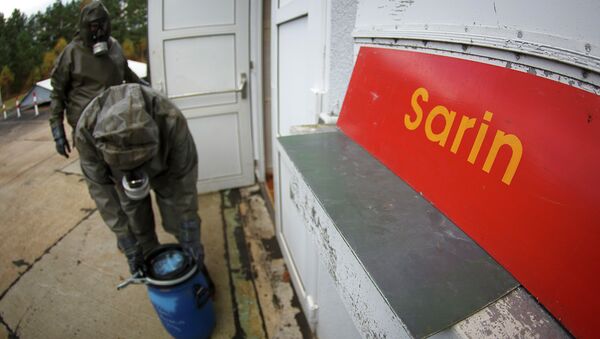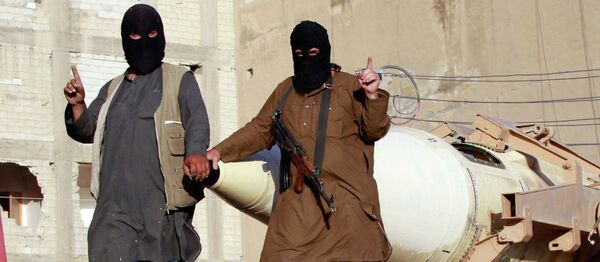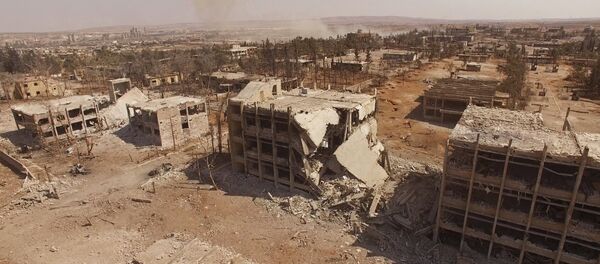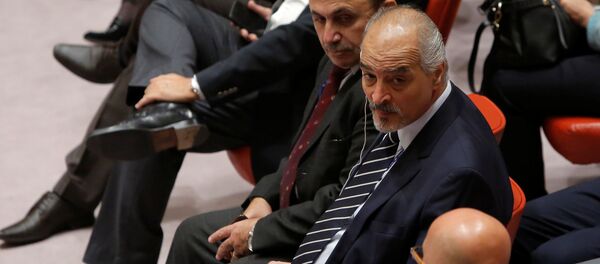Daesh (ISIS/ISIL) may begin to use chemical weapons beyond the Middle East, smuggling the weapons of mass destruction (WMD) out of Syria and Iraq into Europe, Asia and America, Vladimir Platov, an expert in Middle Eastern affairs warned in his opinion piece for New Eastern Outlook.
"Washington is recognizing the fact that ISIS (Daesh) has workshops specially equipped for the production of weapons of mass destruction, including chemical weapons. In particular, they have become particularly proficient in producing mustard gas (sulfur mustard) that is being put in conventional munitions like rockets and shells," Platov wrote.
Earlier this year, CIA Director John Brennan confirmed that Daesh has the capability to produce chlorine and mustard gas.
In an interview with the CBS News program 60 Minutes, Brennan stressed that the terrorist organization had already used chemical weapons.
"We have a number of instances where ISIL (Daesh) has used chemical munitions on the battlefield," Brennan told the media outlet.
In the light of this, the upcoming storm of Mosul, Daesh's Iraqi stronghold, would hardly be a walk in the park, the expert remarked, referring to the possibility of a chemical attack on the part of terrorists against the US-backed Iraqi armed forces.
There is ample evidence that Daesh is producing WMDs and creating chemical stockpiles both in Iraq and Syria, Platov underscored.
What is more embarrassing is that not only Daesh but also some "moderates" had been spotted using chemical weapons in Syria, he stressed.
"On August 2, militants from the Harakat Nour al-Din al-Zenki terrorist group, described by Washington as a part of the 'moderate opposition', attacked the Salah al-Din District of the Syrian city of Aleppo with chlorine, killing at least seven civilians and leaving dozens more severely injured," Platov emphasized.
Furthermore, in mid-September a Kurds militia source revealed that Daesh fighters used chemical weapons in artillery attacks in northern Aleppo.
On September 28 Lt. Gen. Viktor Poznikhir, the first deputy chief of the Main Operational Directorate of the Russian General Staff told reporters that terrorist groups were "preparing provocative attacks by using chemical weapons on Syrian army positions and residential areas in the east part of Aleppo."
Meanwhile, Western media sources continue to accuse Bashar al-Assad's Syrian Arab Army (SAA) of using chemical weapons against its civilians, regardless of the fact that Damascus had handed over all its toxic materials to the Organization for the Prohibition of Chemical Weapons (OPCW) by June, 2014.
"The Persian Gulf monarchies and their 'influential sponsors' across the ocean have repeatedly demanded that the use of chemical weapons in Syria by ISIS (Daesh) be used to blame the Syrian army opposing them," Platov remarked, commenting on the issue.
The Russian expert noted that, reportedly, materials for WMD had been smuggled into the region through the territory of Turkey.
"Chemical weapon materials are being brought to Turkey and being put together in Syria in camps of ISIS [Daesh] which was known as Iraqi al-Qaeda [AQI] during that time," Erdem said.
According to Platov, the situation may spin out of control, resulting in the spread of WMDs across Europe, Asia and even North America.
Back in 2015 the European Parliament voiced its concerns about the increasing threat of WMD proliferation.
"The European Union and its Member States must prepare for the possibility of a chemical or biological attack on their territory by the self-styled 'Islamic State' in Iraq and the Levant [Daesh]," the European Parliamentary Research Service (EPRS) report cautioned.
"Several experts have warned that there is a genuine risk of ISIL/Daesh using chemical, biological, radiological or even nuclear materials in the context of future attacks on European targets. It has been suggested that the group's next weapon of choice could, for example, be an improvised explosive device containing chemical or radioactive materials," the report stated.
"Under these conditions, in the face of an impending threat of WMD terrorist attacks, the international community must unite in its efforts to put an end to these terrorist organizations and those groups affiliated with them," Platov concluded.





